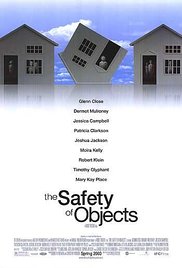
THE SAFETY OF OBJECTS
US, 2003, 121 minutes, Colour.
Glenn Close, Dermot Mulroney, Patricia Clarkson, Jessica Campbell, Joshua Jackson, Moira Kelly, Robert Klein, Timothy Olyphant, Mary Kay Place, Kristen Stewart.
Directed by Rose Troche.
Life in the American suburbs has always fascinated film-makers. It seemed so ideal in the 40s and 50s until some lids were lifted in films like Rebel without a Cause. In later decades, there was all kinds of rebellion. Now families still have their dysfunctional characters as we saw in American Beauty. The Safety of Objects does not have the power of American Beauty nor its fascinating watchableness. It is there on the screen and holds the interest while there but there is no compelling reason for us to see it. Having said that, it is fair to say that should you happen to see it, there is much of interest to watch.
One model for the film is Altman's Short Cuts in which several short stories by Raymond Carver are interwoven and connections created. This time the author is A.M. Homes and writer-director, Rose Troche (Go Fish, Bedrooms and Hallways) has skilfully put a number of stories together to take us through the lives of four families who live near each other over a four day period. It is more explicitly emotive in its American upfrontedness that other cultures might be, more melodramatic.
Troche is served well by a strong ensemble class. In the first family, Glenn Close plays a middle-aged wife and mother whose son (Joshua Jackson) has been lying for a year at home in coma after a car accident. Her husband has moved further to the edge of the family and the daughter (who blames herself for causing the accident as she was fumbling with her security guard boyfriend as the two cars headed for each other) is angry with herself and with her mother, forcing her mother to go on a marathon competition at the mall to win a car. The final scenes between Close and her son are very moving while raising questions about coping with a relative in coma.
Nearby, Patricia Clarkson has been divorced and is trying to cope with her two children and her increasing drinking while their father is about to re-marry and does not visit his children. Her older daughter (Kristen Stewart, Jodie Foster's daughter in Panic Room) is friends with a girl nearby whose mother (Mary Kay Place) is feeling alienated and indulges in New Age fads. Timothy Olyphant plays a gardener who is suffering from the loss of a boy in the car accident and abducts the young girl for two days.
The younger family in the neighbourhood has the father (Dermot Mulroney) undergoing some kind of emotional breakdown after not being promoted at work and not telling his rather controlling wife (Moira Kelly). He has problems to come because his thirteen year old son talks, very seriously, to a doll. In the meantime, he works at the mall, supporting Glenn Close fanatically in her attempt to win the car.
This film is more hopeful as it moves towards some resolution of the problems and unites the characters in a final neighbourhood dinner as they welcome a new couple. The film has a strong sense of humanity.
1. A film of American suburban life? The novelist collaborating on the screenplay? Co-writing with the director?
2. The impact? Characters, psychological conditions, interactions?
3. The title? Reference?
4. The strong cast?
5. The portrait of Esther, age and experience, marriage, her relationship to her husband, her neglecting Julie, the constant care of Paul after the accident, coma? Julie entering her into the contest? The prize of a car?
6. Jim’s story, his age, his work, Susan and her efficiency, his son and his fantasy, his sister’s doll? Jim not being promoted? His phobia, the bomb? His decision to participate in the contest?
7. Helen, her age, concerned about her appearance, youth, the range of products? Her husband liking her as she was?
8. Anne, involved in the divorce, the difficulties, finance, the relationship with Sam, Sam wanting to go to the camp? The son, mental condition, the special school but unable to finance it? Paul, the relationship, her grief after his accident?
9. The character of Randy, landscape gardener, his brother’s death in the accident and its effect on him, depression?
10. Anne’s husband, wanting to visit, wanting to take some Sam out, her running away, the encounter with Randy?
11. Randy taking Sam to the cabin, imagining her as his brother? The decision to drive, to relive the accident, then his realisation that he had taken Sam?
12. The contest, Esther deciding to pull out, Julie angry with her mother, Jim and his angry reaction? With Helen’s son?
13. Esther and her realising what was happening? Her concern for her son? Taking drastic action, suffocating him?
14. The characters becoming calmer, coming to some kind of awareness?
15. The re-creation of the crash, the beers, Johnny, Julie and Bobby, in the other car, fooling around, in a rush to get her home before the curfew? The crash and the consequences?
16. The characters able to acknowledge what had happened?